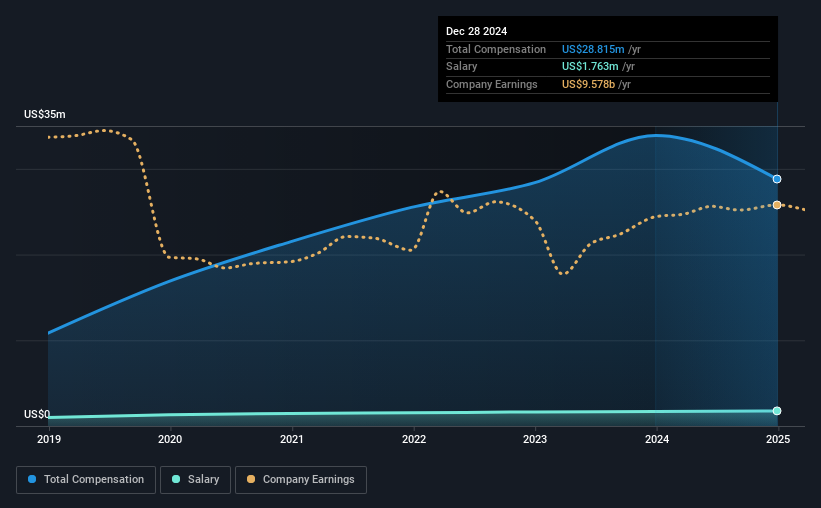Here's Why Shareholders Should Examine PepsiCo, Inc.'s (NASDAQ:PEP) CEO Compensation Package More Closely
Key Insights
- PepsiCo's Annual General Meeting to take place on 7th of May
- Total pay for CEO Ramon Laguarta includes US$1.76m salary
- The overall pay is 78% above the industry average
- Over the past three years, PepsiCo's EPS fell by 2.4% and over the past three years, the total loss to shareholders 13%
The results at PepsiCo, Inc. (NASDAQ:PEP) have been quite disappointing recently and CEO Ramon Laguarta bears some responsibility for this. At the upcoming AGM on 7th of May, shareholders can hear from the board including their plans for turning around performance. This will be also be a chance where they can challenge the board on company direction and vote on resolutions such as executive remuneration. The data we present below explains why we think CEO compensation is not consistent with recent performance.
See our latest analysis for PepsiCo
Comparing PepsiCo, Inc.'s CEO Compensation With The Industry
Our data indicates that PepsiCo, Inc. has a market capitalization of US$183b, and total annual CEO compensation was reported as US$29m for the year to December 2024. Notably, that's a decrease of 15% over the year before. We think total compensation is more important but our data shows that the CEO salary is lower, at US$1.8m.
On comparing similar companies in the American Beverage industry with market capitalizations above US$8.0b, we found that the median total CEO compensation was US$16m. Hence, we can conclude that Ramon Laguarta is remunerated higher than the industry median. Furthermore, Ramon Laguarta directly owns US$63m worth of shares in the company, implying that they are deeply invested in the company's success.
| Component | 2024 | 2023 | Proportion (2024) |
| Salary | US$1.8m | US$1.7m | 6% |
| Other | US$27m | US$32m | 94% |
| Total Compensation | US$29m | US$34m | 100% |
Speaking on an industry level, nearly 14% of total compensation represents salary, while the remainder of 86% is other remuneration. In PepsiCo's case, non-salary compensation represents a greater slice of total remuneration, in comparison to the broader industry. If non-salary compensation dominates total pay, it's an indicator that the executive's salary is tied to company performance.

PepsiCo, Inc.'s Growth
PepsiCo, Inc. has reduced its earnings per share by 2.4% a year over the last three years. Revenue was pretty flat on last year.
The lack of EPS growth is certainly uninspiring. And the flat revenue is seriously uninspiring. These factors suggest that the business performance wouldn't really justify a high pay packet for the CEO. Moving away from current form for a second, it could be important to check this free visual depiction of what analysts expect for the future.
Has PepsiCo, Inc. Been A Good Investment?
With a three year total loss of 13% for the shareholders, PepsiCo, Inc. would certainly have some dissatisfied shareholders. This suggests it would be unwise for the company to pay the CEO too generously.
To Conclude...
Given that shareholders haven't seen any positive returns on their investment, not to mention the lack of earnings growth, this may suggest that few of them would be willing to award the CEO with a pay rise. At the upcoming AGM, the board will get the chance to explain the steps it plans to take to improve business performance.
CEO compensation can have a massive impact on performance, but it's just one element. That's why we did some digging and identified 3 warning signs for PepsiCo that you should be aware of before investing.
Arguably, business quality is much more important than CEO compensation levels. So check out this free list of interesting companies that have HIGH return on equity and low debt.
Have feedback on this article? Concerned about the content? Get in touch with us directly. Alternatively, email editorial-team (at) simplywallst.com.
This article by Simply Wall St is general in nature. We provide commentary based on historical data and analyst forecasts only using an unbiased methodology and our articles are not intended to be financial advice. It does not constitute a recommendation to buy or sell any stock, and does not take account of your objectives, or your financial situation. We aim to bring you long-term focused analysis driven by fundamental data. Note that our analysis may not factor in the latest price-sensitive company announcements or qualitative material. Simply Wall St has no position in any stocks mentioned.
 Wall Street Journal
Wall Street Journal